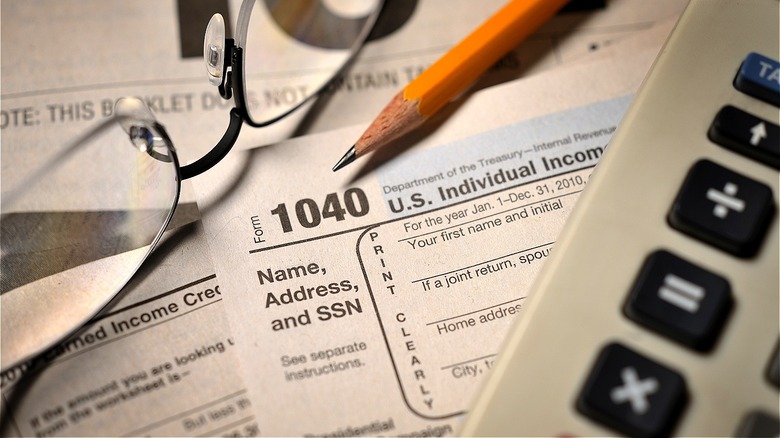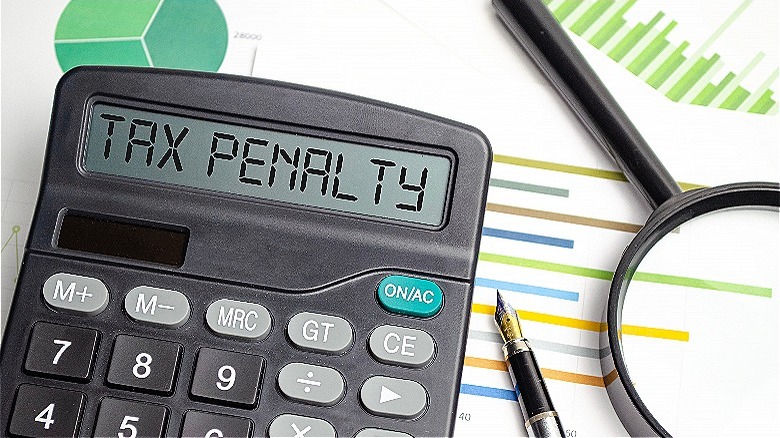Forgetting This One Detail On Your Tax Return Could Get You Fined
Between historically targeting low-income filers of color for audits to receiving $80 billion more in funding in 2022, there are more than a few reasons to be worried about the IRS this tax season. As if filing your taxes wasn't stressful enough already, steep penalties for mistakes can make the process of filing even more intimidating for many taxpayers. In fact, there are a myriad of things that can not only ensure you're more likely to get audited but also leave you with fines and penalties. While there are plenty of mistakes to avoid, perhaps no mistake causes a bigger headache than forgetting to sign your return.
Simply put, the IRS will not accept an unsigned return, meaning that forgetting your signature is tantamount to not filing your tax return in the first place. Plus, forgetting a signature means you're more likely to think you filed on time and, depending on how long it takes to realize the mistake, could end up costing you.
The risk of not realizing your return wasn't accepted is that you could end up missing the tax filing deadline. Missing the filing deadline can lead to late-filing penalties, and these penalties can add 25% to your total tax bill. With that being said, you won't face any penalties for filing your tax return late if you have a refund coming from the IRS. However, there could still be late fees and penalties associated with your state return so it's ultimately smarter (and safer) to make sure you file on time.
What else can you get fined for?
While failing to sign a tax return obviously can lead to unintended consequences, the IRS actually has various other rules that can also lead to penalties. These can range from failing to file a tax return at all to understating your full tax liability. Even worse, simple math errors and even miscalculated home office deductions can ultimately lead to penalties and fines. It's important to remember, too, that these fines are all in addition to the tax liability payment you may still owe, depending on the mistake.
Failure to file can lead to a 5% penalty (on the unpaid tax amount) each month your return is late. This penalty does cap at 25% of your balance (aka five months' worth). If your return ends up being more than 60 days late, there's a minimum penalty of $435 (as of 2023) or 100% of the tax owed (whichever amount is less). If you fail to pay your owed taxes, you can expect a 0.5% tax penalty (on the tax amount you owe) every month you're late. This, like with failure to file, caps at 25% of your balance.
Installation payment agreements can reduce a penalty tax to 0.25% for the duration of your payment plan. The IRS also charges interest on unpaid taxes, with a new interest schedule released every year. For 2023, the IRS quarterly interest rates vary depending on the specific quarter of the year and the category of the person or group/corporation paying it.
How tax preparer fines can involve you
Paid professionals who handle your tax returns aren't protected from IRS fines. Even worse, you aren't always protected from their mistakes either. These penalties can be much steeper than regular taxpayer fines and can range from $50 to $100,000, depending on the severity of the violation (like you, failure to sign their name could lead your preparer to get fined). The IRS can also calculate things like the number of violations your tax preparer has, inflation rates, and the specific tax years involved to determine just how much your tax preparer has to pay. That being said, you should always use reputable tax professionals if you do decide to use tax preparers.
As the taxpayer, there are instances when your tax preparer's mistakes could end up costing you personally. For starters, relying on a tax adviser isn't considered reasonable enough cause for failing to file a return or pay a tax on time. Relying on an adviser can, however, be considered a reasonable cause for accuracy-related violations depending on the expertise of the adviser and the good faith nature of the advice in question.
In certain cases, a taxpayer can request penalty abatements. Keep in mind, though, that while one of the acceptable reasons does include reliance on a tax professional, it's not a guarantee the penalty will actually be removed. As for taxpayers who simply made a mistake (with no previous penalties in the last three years), they can apply for first-time penalty abatement.


